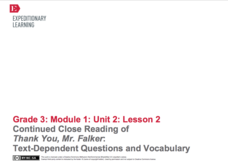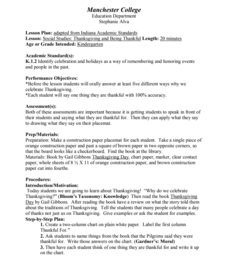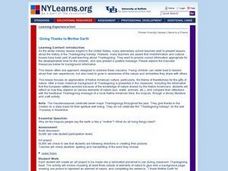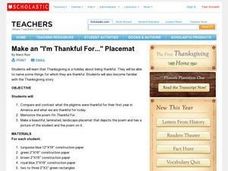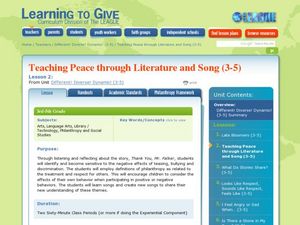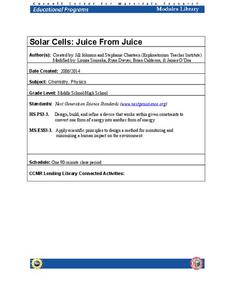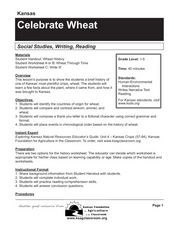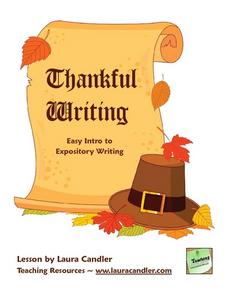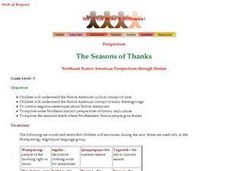Curated OER
Giving Thanks for Food and Farms
Sarah Stewart’s The Gardener and Food from Farms by Nancy Dickmann display the importance of community farms. After reading these short picture books, class members draw connections between farms and the food we eat each day. As a...
PBS
A Veterans Day Thank You Note
This Veterans Day inspire scholars to say thank you to a veteran. Here, learners discover key details about a specific war using an interactive timeline, and then write a thank you letter offering their gratitude to someone who risked...
EngageNY
Continued Close Reading of Thank You, Mr. Falker: Text Dependent Questions and Vocabulary
In the second lesson plan in a series that revolves around the story, Thank You, Mr. Falker, learners practice the skill of answering direct questions from the text while using complete sentences. After a teacher-led review of how to...
Curated OER
Make an "I'm Thankful For..." Placemat
Learners compare and contrast what they are thankful for and what the pilgrims were thankful for, and create a Thanksgiving placemat. They read and recite the poem "I'm Thankful For," and create a laminated landscape placemat that...
University of Manchester
Thanksgiving and Being Thankful
Students share with the class what they are thankful for. In this Thanksgiving lesson, students create place-mats for Thanksgiving. Students discuss ways we honor and celebrate Thanksgiving. They then make a list of things they are...
Curated OER
Giving Thanks to Mother Earth
Students create an art project to be made into a laminated placemat to use during a classroom Thanksgiving feast. The lesson plan involves choosing at least three cutouts of elements of nature to glue onto a background page, drawing one...
Curated OER
"I'm Thankful For..." Placemat
Pupils discover the story behind Thanksgiving through comparing and contrasting what pilgrims were thankful for, memorizing Thanksgiving poems, and creating a placemat that depicts the poem.
PBS
Experience a Solar Eclipse
Didn't catch the last solar eclipse? Now every day can be eclipse day, thanks to an interactive instructional activity from PBS' Space series for middle schoolers! The well-rounded multi-media experience includes video clips, an...
Curated OER
Say "Thank You" in 100 Languages!
Young scholars put the "Thanks" back in Thanksgiving with this geography and language activity that teaches students to say "thank you" in many languages.
Scholastic
Writing Letters of Gratitude
A lesson begins with a discussion on gratitude—what does it mean, and for who are learners thankful? Scholars share their thoughts and feelings then choose a community worker to which they wish to share their gratitude. Writers compose a...
Curated OER
LEAGUE: Learning to Give
Students explore the effects of human actions. In this respect and discrimination lesson, students read Thank You, Mr. Falker and identify the consequences of bullying and teasing. Students then relate personal experiences of hurt...
Cornell University
Solar Cells: Juice From Juice
Unleash the power of ... blackberries! Science superstars create solar cells using the juice of berries or leaves of a citrus tree in an engaging lab. In addition to offering a plethora of resources, the teacher's guide gives background...
Curated OER
Celebrate Wheat
Students compose a thank you letter and a time line about the history of wheat. For this wheat lesson plan, students learn and discuss the origin of wheat, and the differences between einkorn, emmer, and wheat.
Curated OER
I'm Thankful For...
First graders engage in a lesson plan that demonstrates the character trait of thankfulness. The teacher enthusiastically shares something to be thankful for with the class. Then they spend the time to draw an idea of something to be...
Curated OER
Thankful Writing
Students go through the entire writing process to create an expository essay about what they are thankful for. They use graphic organizers to guide them through the process.
Curated OER
Different! Diverse! Dynamic! What Do Stories Share?
Students compare and contrast the stories, "Leo, the Late Bloomer," and "Thank You, Mr. Falker." They develop a Venn diagram, and write and illustrate the central theme of the stories.
Curated OER
Give Me A Museum and I'll Fill It
Third graders view pieces of Pablo Picasso's art. They discover art can have images and words to express meaning. They create their own piece of art and share with the class.
Curated OER
Give Respect
Young learners explore what it means to be respectful. This resource includes a two page chart depicting rules for different settings at school such, as the cafeteria and the playground. What does following the rules look like? What does...
American Chemical Society
Surface Tension
A drop of dew holds a sphere shape even when sitting on a seat thanks to the surface tension of water. Learners observe the phenomena of surface tension in water. Through demonstrations, hands-on activities, and discussions they explore...
Curated OER
Washer Game
Students discover the strengths in their classmates through playing various activities. In the washer game, students pass washers around as they give genuine compliments. Students discuss ways to make compliments meaningful and explore...
Curated OER
Lummi Stick Macarena
Hey, Macarena!! The Macarena is very simple to dance: left, right, left, right, wiggle the hips. Spice it up a bit by giving the class things to hold in their hands such as lummi sticks or scarves. Give them anything that will not be too...
Curated OER
Impromptu Speech
Polish proper public speaking skills! Each speaker makes a short speech without getting the opportunity to rehearse it. There are 46 topics on small cards which can be cut apart, put in a hat, and drawn out to be used as a speech topic....
Curated OER
Teaching Peace through Literature and Song
Negative effects of bullying come to light through listening to the book Thank You, Mr. Falker by Patricia Polacco. Class members identify philanthropic acts portrayed in the story and make illustrations to connect them to their own...
Curated OER
The Seasons of Thanks
First graders explain the Native American cyclical concept of time


